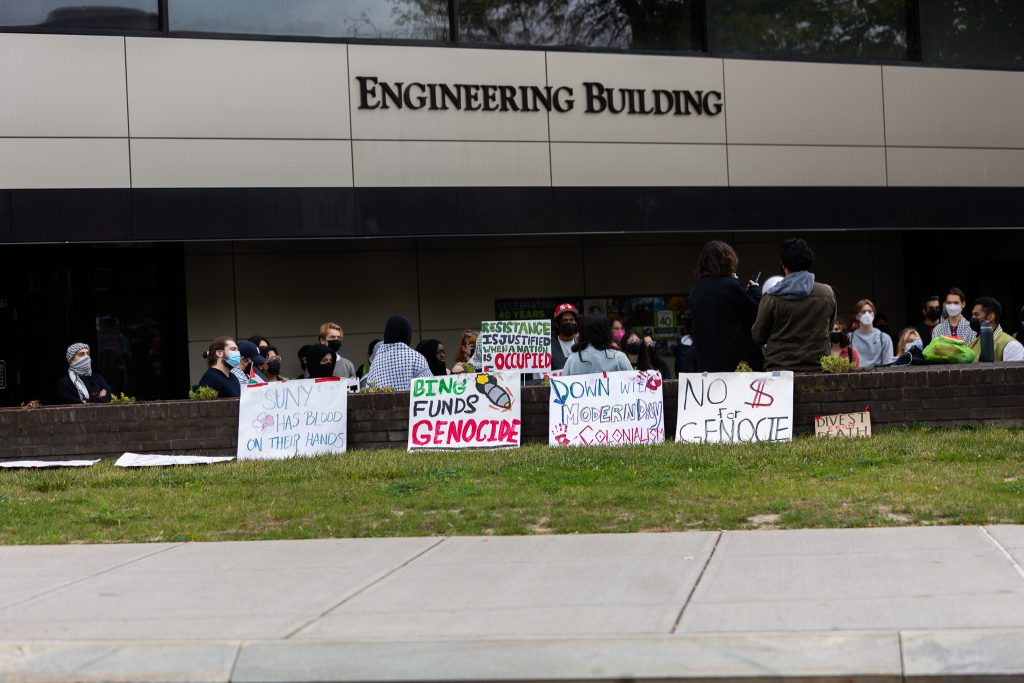To demonstrate their continued solidarity with the Palestinian people, the Students for Justice in Palestine led a walkout and rally on Monday, the first anniversary of the Oct. 7 Hamas attack and the subsequent beginning of the continued humanitarian crisis in Gaza.
Amid a heavy police presence, the rally commenced at 1 p.m. in front of the Engineering Building. After the attacks one year ago, Israel began a new wave of military offensives in Gaza, killing at least 41,600 Palestinians as of Oct. 7, 2024, as reported by the United Nations Office for the Coordination of Humanitarian Affairs. The Israeli military began bombings, air strikes and a ground invasion in Lebanon this September. Speakers at the rally called for a “complete divestment” of Binghamton University funds from defense companies and an arms embargo of Israel.
A written statement from SJP to Pipe Dream referenced an Integrated Food Security Phase Classification report published in June that said 96 percent of Gazans “face high levels of acute food insecurity” and other studies reporting that 97 percent of water from Gaza’s main water source is undrinkable.
“October 7th marks one year of Israel’s continued genocide of Palestinians,” the organization wrote. “In the last year, hundreds of thousands of Palestinians have been martyred by the Israeli regime, most being women and children.”
Designated safety marshals distributed food, water and masks to those assembled. The rally’s leaders said they would remove anybody who was sexist, racist, antisemitic or Islamophobic.
Representatives from other student organizations, including the Black Student Union, Dissenters, the Graduate Students for Justice in Palestine and the Latin American Student Union, condemned Israel’s continued attacks on Gaza, which have since expanded to other countries like Lebanon and Syria.
Speakers compared U.S. domestic policy to its continued military support of Israel. One added that while victims of the recent Hurricane Helene received minimal financial support, the United States has given billions in military aid to Israel — $17.9 billion since last year, according to the Associated Press.
A representative from BSU read a pro-Palestinian poem by Marcellus Williams, who was executed on Sept. 24 in Missouri despite objections from prosecutors, the victim’s family and advocacy groups because of a lack of reliable evidence proving he committed the crime he was sentenced for. A Palestinian American student read poems written before Oct. 7, and others led the group in prayer.
Speakers criticized the University’s lack of response to calls for divestment, condemning the collaboration between the Thomas J. Watson School of Engineering and Applied Science and weapons manufacturing companies like Lockheed Martin. Demonstrators then chalked the entrance to the Engineering Building with statements like “Watson Kills Kids” and “Lockheed Kills Palestinians.” Signs reading “Engineers Should Build Not Destroy” and “Students for BDS” were visible from the adjacent sidewalk.
“Stationed outside the Watson engineering building, SJP has organized this rally to expose Binghamton University’s complacency in the genocide of Palestinians,” the statement from SJP read. “We demand Binghamton’s divestment from weapons manufacturers facilitating the genocide in Gaza. There will be no business as usual until Palestine is free!”
Students also said University administrators have ignored Palestinian, Muslim and Arab student voices, emphasizing the harassment and doxxing students have faced for expressing their views.
In response to a request for comment about the protesters’ concerns, a University spokesperson referred to a Monday morning B-Line to the campus community — co-authored by Provost Donald Hall, Vice President of Diversity, Equity and Inclusion Karen Jones and Vice President for Student Affairs Brian Rose — that highlighted the importance of respecting free speech throughout the week.
“October 7 and the days that follow will undoubtedly be remembered in different ways by different communities on campus, but will certainly be an emotional time for most,” the B-Line read. “Please value the community and campus we share in your words and actions.”
Several counterprotesters waved large Israeli flags, with one individual wearing a “Bring Them Home Now” shirt. Some demonstrators moved closer, stepping onto the brick ledge in front of the Engineering Building, with safety marshals blocking them from the crowd. To prevent people from falling, University police officers asked counter-demonstrators to step down off the ledge.
Later that day, SJP held a “Year in Perspective” event that focused on political education surrounding the crisis in Gaza. The speakers began by discussing Palestine in 2023 before Oct. 7 and the following military offense. Gaza has been under a military blockade since 2007, with movement in and out heavily restricted. One individual said preexisting Israeli efforts to settle in Palestinian territory were amplified after the Oct. 7 events.
Speakers drew attention to the atrocities committed by Hamas a year ago and during subsequent Israeli counteroffensives, while acknowledging conflicting narratives. They mentioned the reported human rights violations committed by the Israeli military, like the destruction of hospitals, religious and heritage sites and educational facilities, targeted attacks on journalists and U.N. aid workers, and sexual violence in Israeli prisons.
The rally was part of SJP’s “Week of Rage,” which consists of several events this week. A candlelight vigil will be held on Wednesday in collaboration with the Arab Student Association, the Muslim Student Association and the Islamic Organization of the Southern Tier. Throughout the week, SJP will hold a bracelet sale, with all proceeds going to the Middle East Children’s Alliance, a culture poetry night and a Palestinian peer support group meeting.
“At the end of the day, we don’t have the ability to affect direct change immediately because we don’t have the reins of power,” said a rally spokesperson who requested anonymity. “But institutions and higher [education] institutions like Binghamton University and then, by larger extension, more directly, the United States government and the Israeli government — those who actually have the power to change what’s going on — have to listen to the populace. That is the aspect, the cornerstone of what a democracy is — listening to the people chanting — and that’s what we’re doing.”



